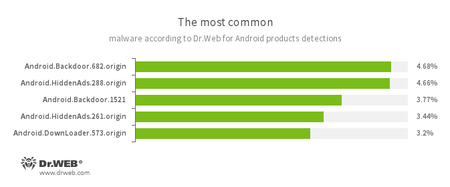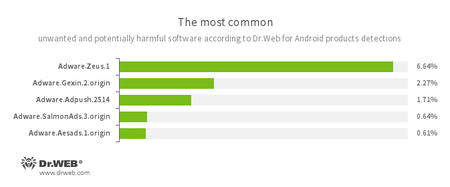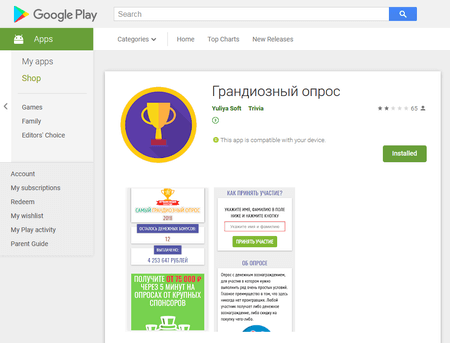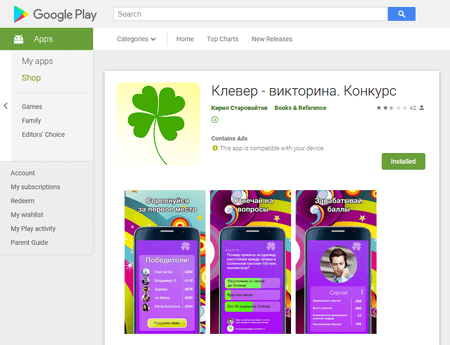Doctor Web’s overview of malware detected on mobile devices in October 2018
[% DEFAULT FILE_REVIEW = ''; NAME_SOME_ARRAY_IN_MACROSNAME = [ { box => "Overview" }, { box => "Threat of the month" }, { box => "Statistics" }, { box => "Trojans on Google Play" }, { box => "Other threats" } ] %] [% BLOCK global.tpl_blueprint.content %]
October 31, 2018
In October, information security specialists discovered an Android Trojan capable of executing C# scripts sent from a remote server, as well as downloading and launching malicious modules. More malicious applications were also detected on Google Play this month.
PRINCIPAL TRENDS IN OCTOBER
- The detection of malicious programs on Google Play
- Detection of an Android Trojan that could receive and compile a C# code from attackers to execute it on mobile devices
Mobile threat of the month
Doctor Web specialists have detected applications with the built-in downloader Trojan
The Trojans' unique features are as follows:
- they request administrative privileges to hinder their removal from the system;
- they hide the app icon from the list of programs on the main screen of the operating system;
- they download other Trojans disguised as system software and prompt the user to install them.
According to statistics collected by Dr.Web for Android
Android.Backdoor .682.originAndroid.Backdoor .1521- The Trojans that execute cybercriminals’ commands and help them to control infected mobile devices.
Android.HiddenAds .261.originAndroid.HiddenAds .288.origin- The Trojans are designed to display intrusive advertisements. They are distributed under the guise of popular applications by other malicious programs, which in some cases quietly install themselves in the system catalog.
Android.DownLoader .573.origin- A Trojan that downloads other malware applications.
- Adware.Zeus.1
- Adware.Gexin.2.origin
Adware.Adpush .2514- Adware.SalmonAds.3.origin
- Adware.Aesads.1.origin
- Unwanted program modules incorporated into Android applications and designed to display obnoxious ads on mobile devices.
Trojans on Google Play
At the beginning of the month, Doctor Web experts detected the Trojan
Later, security researchers detected the Trojan
In late October, Doctor Web analysts investigated the malware
Aside from that, the Dr.Web virus database was updated with entries to detect new malware
Other threats
Among the mobile malware detected in October was the Android banker
Cybercriminals distribute malicious programs to Android mobile devices via Google Play and fraudulent or hacked websites. To protect smartphones and tablets, it is recommended that users install Dr.Web anti-virus products for Android.
Your Android needs protection
Use Dr.Web
- The first Russian Anti-virus for Android
- More than 135 million downloads on Google Play alone
- Free for users of Dr.Web home products








![[You Tube]](https://st.drweb.com/static/new-www/social/youtube.png)
![[Twitter]](https://st.drweb.com/static/new-www/social/twitter.png)
![[Facebook]](https://st.drweb.com/static/new-www/social/facebook.png)
![[Instagram]](https://st.drweb.com/static/new-www/social/instagram.png)
![[Spiceworks]](https://st.drweb.com/static/new-www/social/spiceworks.png)